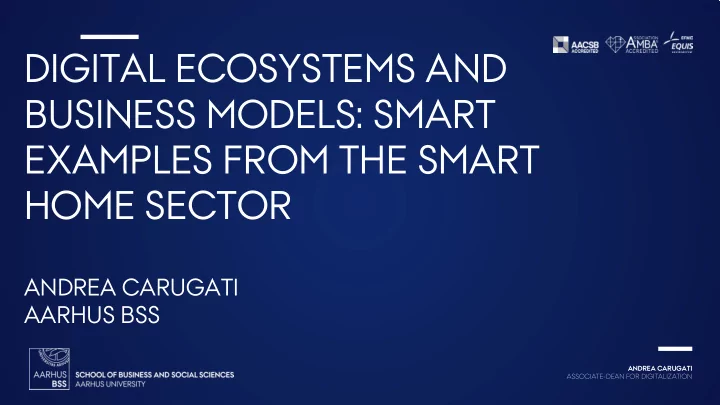

DIGITAL ECOSYSTEMS AND BUSINESS MODELS: SMART EXAMPLES FROM THE SMART HOME SECTOR ANDREA CARUGATI AARHUS BSS ANDREA CARUGATI ASSOCIATE-DEAN FOR DIGITALIZATION
AGENDA Define Ecosystems Ecosystems drivers Examples from the smart home market Strategies to participate in ecosystems 2 2
ECOSYSTEMS? Technology ecosystems are product platforms defined by core components made by the platform owner and complemented by applications made by autonomous companies in the periphery. Ecosystems offer a larger system of use than the original platform owner created. The value of an ecosystem is larger than the sum of the single parts. Innovation happens outside the platform Assets are outside the platform 3 3
ECOSYSTEMS Ecosystems create customer dependencies . Customers make decisions about products based on whose ecosystem they want to be a part of. They commit to, and invest in, ecosystems that can integrate seamlessly with their personal and work environments. Customers will invest in the ecosystem – not in products. 4 4
5 5
WORKS WITH … 6 6
7 7
8 8
GOOGLE VISION FOR THE THOUGHTFUL HOME 9 9
ECOSYSTEM “SHAPES” 10
OPTIONS IN THE ERA OF ECOSYSTEMS 11 11
VALUE GENERATION IN ECOSYSTEMS: DATA 7 billion people and more than 30 billion devices connected to the internet by 2020, Digital platforms — wherein participants with different goals and objectives are connected on a commission basis — will be the mechanisms to mediate relationships in ecosystems. Ecosystems enable companies to exchange products and services for information or analytics. It’s important to understand the changing definition of “value” that ecosystems create. Value: data, monetary, reputation, services, privacy (dynamically leveraged) 12 12
CONCLUSIONS Understand or define your ecosystem Move out of the supplier box Position your organization to be an ecosystem driver – possible? Position your organization to be a modular producer – safer bet? Insure value creation and generation 13 13
Recommend
More recommend